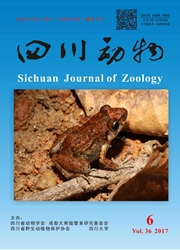

 中文摘要:
中文摘要:
为了阐明温度和增加胎仔数对大绒鼠Eothenomys miletus哺乳期能量代谢的影响,本研究测定了在不同温度条件下增加胎仔数(比正常胎仔数多),大绒鼠的摄食量、胎仔数、胎仔质量、静止代谢率、非颤抖性产热和乳腺质量。结果表明:不同胎仔数对大绒鼠的摄食量、胎仔质量和产热能力没有影响。低温增加了母体的摄食量和产热能力,断奶时低温组的胎仔质量显著低于常温组。低温组和常温组大绒鼠的乳腺质量差异无统计学意义。研究结果说明低温可以增加大绒鼠摄食量,但是对乳腺质量没有影响,表明大绒鼠哺乳期的持续能量摄入上限可能受到乳腺分泌乳汁的限制,支持外周限制假说。
 英文摘要:
英文摘要:
In order to investigate the effects of temperature and raising litter size on energy metabolism during lactation in Eothenomys miletus,female E. miletus with additional fetus that above their natural numbers were maintained during lactation either in warm( 25 ℃) or cold( 5 ℃) conditions. Food intake,litter size and mass,resting metabolic rate,nonshivering thermogenesis and the weight of the mammary glands were measured. The results showed that no differences were observed in food intake at peak lactation,litter mass and thermogenesis between females raising litters of different size. Coldexposed females increased food intake and thermogenic capacity,but weaned significantly lighter litters with smaller pup sizes compared with females in warm conditions. The weight of the mammary glands did not differ between warm and cold-exposed females. These data suggested that cold exposure increased food intake,but had no effect on the capacity of the mammary glands in E. miletus,indicating that sustained energy intake was more likely peripherally caused by the capacity of mammary glands to produce milk. These data supported the peripheral limitation hypothesis.
 同期刊论文项目
同期刊论文项目
 同项目期刊论文
同项目期刊论文
 期刊信息
期刊信息
